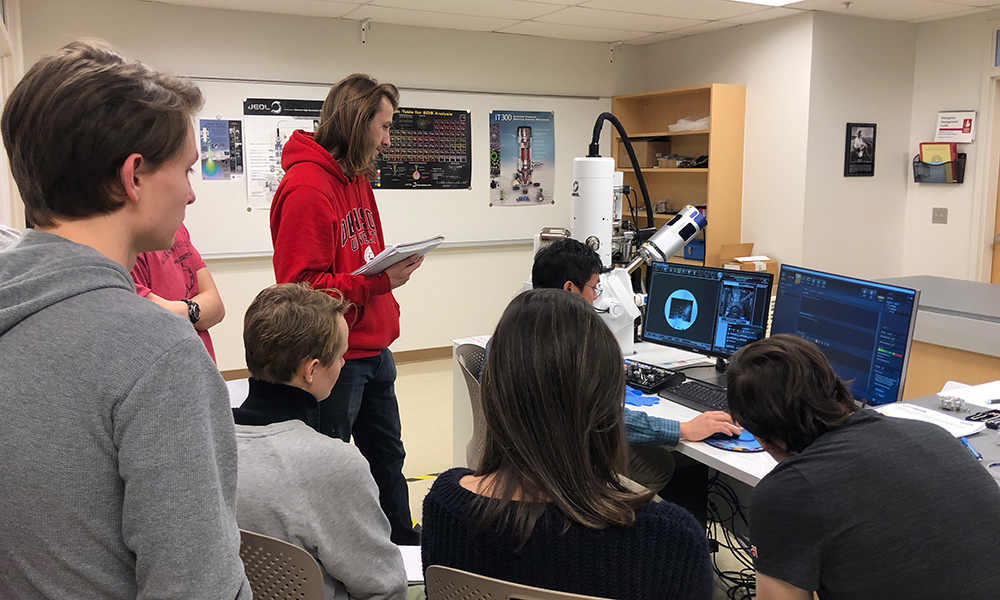Denison University announces the National Science Foundation (NSF) has awarded the University a $400,000 grant to obtain a state-of-the-art scanning electron microscope to deepen student and faculty knowledge — and provide a rare opportunity for undergraduate science research. The sophisticated instrument was installed at Denison in February 2020.
The JEOL JSM-IT500HRLV scanning electron microscope (SEM) includes integrated Oxford Instruments AZtec TruMap Energy Dispersive X-Ray Spectrometer EDS and CL (cathodoluminescence) for elemental analyses and characterization along with a sputter coater and critical point dryer. This highly advanced instrument enhances and creates analytical capabilities for faculty and student research and teaching in the Earth & Environmental Sciences, Chemistry & Biochemistry, and Biology programs.
“Very few undergraduates, whether in large research universities or private liberal arts colleges, have the opportunity to learn from and operate a scanning electron microscope of this quality,” says Associate Professor of Earth and Environmental Sciences Erik Klemetti, principal investigator of the grant.
He adds, “Students will use the SEM in both classes and research. Research-driven projects in classes like Petrology & Volcanology allow students to gain first-hand experience using state-of-the-art instruments in the field. Summer research projects examine items from a few thousand to billions of years old, such as micrometeorites collected from the Granville area and the composition of archeological artifacts from the pre-history of Ohio.”
Professor Joe Reczek says “This instrument is an incredible tool for ‘seeing’ the nano-world all around us. And we are super excited to use it in science outreach with the community, especially to bolster our efforts through The Works, COSI, and local schools.”
Reczek, a professor of chemistry and biochemistry, along with Associate Professor of Biology Andrew McCall, Associate Professor of EESC Matthew Jungers, and Associate Professor of Chemistry & Biochemistry Jordan Katz are co-principal investigators on the grant. The interdisciplinary team emphasizes the importance of the SEM to students across a number of natural science disciplines at Denison.
More about the JEOL Scanning Electron Microscope:
The instrument’s capabilities are customized to support the needs of externally and internally funded science research: (1) high resolution and high magnification characterization and imaging of a wide variety of materials; (2) qualitative, semi-quantitative and quantitative analysis for crystals and other materials, both natural and synthetic, via EDS and CL; and (3) variable pressure capability for versatility in imaging and analysis of low- to non-conducting, as well as wet, samples.
Specifically, in Earth & Environmental Sciences, the SEM-EDS/ CL allows quantification of the zoning of igneous crystals and composition of glass in volcanic rocks and tephra, and for the evaluation of grain coatings on soil and fluvial sediment for gamma spectroscopy and documentation of diagenetic alteration in fossil bivalve mollusks prior to isotopic analysis.
In the Department of Chemistry and Biochemistry, the instrument supports multiple avenues of functional materials development, including novel laser-writable charge-transfer liquid crystals, as well as the imaging of nanostructured photoelectrodes and catalysts for physical characterization and determination of the elemental composition of mixed-metal dopants by EDS.
In the Department of Biology, the instrument allows the examination of surface structures and anatomy of immature and mature flowers under low vacuum or processed using the critical point dryer.
This material is based upon work supported by the National Science Foundation under Grant No.1919569.
